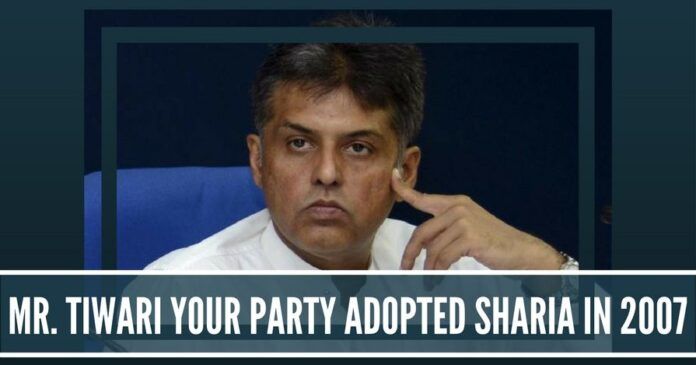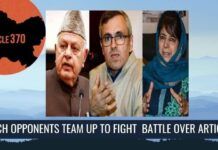
Will Manish Tiwari condemn Congress and Leader of Opposition in Rajya Sabha, Ghulam Nabi Azad, and term what they did in 2007 an “unforgivable sacrilege”?
Congress national spokesperson and former Information and Broadcasting (IB) Minister in the Manmohan Singh-led UPA Government has taken an exception to the omission of the words “secular” and “socialist” from the Preamble of the Indian Constitution issued by the IB Ministry on the eve of India’s Republic Day. He has described this omission as “unforgivable sacrilege”.
Has Manish Tiwari the right to denounce the BJP-led NDA Government over the issue of secularism? No Congress leader can have the audacity to criticise the Narendra Modi Government on this count given the fact that it rejected secularism and socialism for the Muslim-majority Jammu and Kashmir in February 2007 on the floor of the Assembly itself and, instead, adopted Sharia.
What did the Congress’ Ghulam Nabi Azad-led coalition government do in January-February 2007 to give an effect to what Prime Minister Manmohan Singh had said with much fanfare on May 25, 2007?
Let us revisit 2006 and 2007 to understand its commitment to secularism and socialism. Such an exercise is a must to call Manish Tiwari’s bluff and put things in perspective.
May 25, 2006, saw the people of Jammu in a jubilant mood. They said that an important chapter had been opened in the history of relations between Kashmir and Jammu – a chapter which promised a fair share to them in the government, as also promised the growth of secularism in the Muslim-majority State of Jammu and Kashmir. Some of them had even said that a great step forward had been taken by the then Prime Minister Manmohan Singh for which the people of Jammu had cried and fought for years. All these hopes had stemmed from the Manmohan Singh’s “closing remarks” at the second roundtable conference, held on May 25 at Srinagar. It also stemmed from the fact that it was for the first time in 60 years that any Union Government involved all political parties and prominent social groups in the state in a process aimed at ascertaining their views on the problems afflicting the people and finding a lasting solution to them.
It bears recalling that Prime Minister Manmohan Singh had on that day announced the setting up of five working groups, along with the terms of reference. The ones which had pleased the people of Jammu province all the more included “methods of strengthening democracy, secularism and the rule of law in the state”, “effective devolution of powers among different regions to meet regional, sub-regional and ethnic aspirations” and “balanced regional and sub-regional development within the state” (Daily Excelsior, May 26, 2006).
What did the Congress’ Ghulam Nabi Azad-led coalition government do in January-February 2007 to give an effect to what Prime Minister Manmohan Singh had said with much fanfare on May 25, 2007?
A brief reflection on what the ruling coalition comprising the Congress and the Kashmir-based and Kashmir-centric Peoples Democratic Party (PDP), the People’s Democratic Front (PDF) and the CPI-M and the main opposition National Conference (NC) did in the Assembly during the budget session would be in order and hence, a reference here to the adoption and defeat of eight “Private Member’s Bills” in January-February 2007 budget session of the Jammu & Kashmir Legislature.
The bill provided for one-year imprisonment for those who would not show the kind of respect the state flag deserved.
One, the Jammu and Kashmir National Panthers Party (JKNPP), one of the coalition partners, moved a “Private Member’s Bill” in the Assembly seeking support of the House in favour of the suggestion that there should be only one flag for Jammu and Kashmir. In effect, the bill highlighted the significance of the national flag and wanted all the political parties to adopt the same so that the provisions concerning the state flag in the Jammu and Kashmir Constitution were repealed and the national flag reigned supreme in the state as was the case with other states of the Union. All the coalition partners, without any exception, and the opposition NC summarily rejected the landmark “Private Member’s Bill”, which was simply aimed at integrating the state with the rest of the country or bringing the state on a par with other states of the Union.
Two, it may sound unbelievable and ludicrous, but it is a fact that all the coalition partners, with the exception of JKNPP, adopted in no time a “Private Member’s Bill”, which was moved by the opposition NC. The bill provided for one-year imprisonment for those who would not show the kind of respect the state flag deserved. The NC had moved this bill to counter the BJP’s age-old one-flag (national flag) and one-constitution (Indian Constitution) slogan. The defeat of the “Private Member’s Bill” on the national flag and the adoption of the bill on punishment for those not showing due respect to the state flag and the unqualified support extended by the ruling party to the Valley-based outfits had sprung a big surprise.
Three, the lone BJP legislator, Jugal Kishore Sharma (presently Lok Sabha member) moved a “Private Member’s Bill seeking citizenship rights for the refugees from West Pakistan, numbering approximately 1.5 lakh. He made a passionate plea to the House that his bill needed to be passed as those hapless refugees had been denied their fundamental rights, including the right to own immovable property in the state, right to contest election to the Assembly and local bodies, right to franchise, right to equality, right to higher and professional education, right to bank loan, right to obtain jobs under the State Government and so on, but with no result. The ruling party and all other parties, barring the JKNPP and the RSS-floated Jammu State Morcha (JSM), opposed the bill tooth and nail. The result was the collapse of the bill. (The JSM had one MLA in the 87-member House.)
The opposition of the ruling Congress to the bill was beyond comprehension given the fact that Manmohan Singh (Prime Minister), Lal Kishan Advani (former Deputy Prime Minister), Inder Kumar Gujral (former Prime Minister), Jagmohan (former Governor and Union Minister), Arun Shourie (Member Rajya Sabha and former Union Minister) and so on were all refugees from Pakistan. That the Congress and the NC, the PDP, the PDF and the CPI-M joined hands and got the bill defeated only indicated their lack of commitment to the human rights of the refugees from West Pakistan, as also their willingness to go with those in Kashmir who were opposed to those refugees on the ground that their empowerment would change the demographic profile of the Assembly segments in Jammu and enhance the Jammu’s representation in the legislature.
Four, the JKNPP moved another “Private Member’s Bill” seeking incorporation of the words “secular and socialist” in the preamble of the Jammu and Kashmir Constitution. The upshot of its whole argument was that “since the preamble of the Indian Constitution contained these two words, the same needed to be incorporated in the State Constitution so that the state polity was given a secular and socialist orientation”. The bill failed to carry conviction. The ruling Congress, its coalition partners, including the Left parties, plus the opposition NC, rejected out-of-hand this bill, thus indicating their negative approach to the cardinal principles of secularism and socialism.
Five, the JKNPP moved yet another “Private Member’s Bill” in the Assembly in the same session. It was designed to ensure parity between Kashmir and Jammu as far as their representation in the Assembly was concerned. The bill said that Jammu province and Kashmir division each is divided into 52 Assembly segments so that the Jammu’s age-old grievance was redressed. But it was bitterly opposed. The ruling Congress, like the PDP, the NC, the CPI-M and the PDF, repudiated outright this bill. The opposition of the Congress to the bill was all the more surprising considering the fact that its core constituency was Jammu province, especially its Hindu-majority areas, which returned as many as 27 members to the Assembly.
The NC and the PDP, on the other hand, opposed the bill saying that “Jammu and Kashmir enjoys a special status within the Union and, hence, the life of the Assembly has to be six-year”.
Six, the NC sprang a surprise in the Assembly when it moved a “Private Member’s Bill” seeking protection of the temples and shrines of the Kashmiri Hindus. It was expected that this bill would be adopted at once. But it did not happen. All the coalition partners, excluding the JKNPP, and the BJP and the JSM, joined hands and ensured the defeat of the bill. It is necessary to catalog the reasons behind the opposition of the ruling coalition to this bill.
Seven, the NC moved another “Private Member’s Bill” on the need to adopt Sharia laws. While the ruling coalition and the JKNPP extended their unqualified support to this bill and adopted it, the BJP and the JSM opposed it. The ideologue of the PDP and Deputy Chief Minister, Muzaffar Hussain Beig, did express some reservations, but ultimately he also voted for the bill.
Eight, the JKNPP moved one more “Private Member’s Bill” seeking the reduction in the life of the Assembly from six to five years. Its argument was that “since the term of the assemblies in the country was five years, the Jammu and Kashmir Assembly should also be constituted for a period of five years”. The Bill was defeated in no time. The then Health Minister Mangat Ram Sharma made a mockery of himself and his party when he said in the Assembly that the bill if adopted, would mean “ reduction in the pension of the legislators”. He said that “six-year term benefits the legislators”.
The NC and the PDP, on the other hand, opposed the bill saying that “Jammu and Kashmir enjoys a special status within the Union and, hence, the life of the Assembly has to be six-year”. It needs to be noted that it was the NC, a staunch supporter of greater autonomy, which had in 1977 adopted the central legislation enhancing the life of the Lok Sabha and the assemblies from five to six-year — legislation which the Janata Party Government repealed.
The bitter opposition of the ruling coalition and the NC to certain “Private Member’s Bills” and their unqualified support to certain other bills indicated two things: Support for those bills which had the potential of further widening the already rather wide gulf between the state and New Delhi and opposition to those which had the ingredients of bringing the state closer to New Delhi, secularising the state polity, empowering the refugees from West Pakistan and dispensing justice to Jammu province. The message was that they stood for a system that was different from what was in vogue in the rest of the country.
Will Manish Tiwari condemn Congress and Leader of Opposition in Rajya Sabha, Ghulam Nabi Azad, and term what they did in 2007 an “unforgivable sacrilege”? He must if he is really meant what he said.
- ‘Kashmir My core constituency’: Revisiting July 12, 2003 to understand politics, Omar Abdullah-style - March 15, 2024
- Total deviation from traditional approach: Seven takeaways from PM Modi’s March 7 Srinagar visit - March 9, 2024
- Status of political parties: Why is further J&K reorganization imperative? - March 1, 2024











Congress has multiple faces like wicked cunning,innocent ,anti national,gentle. and shows the face suited to the situation.
It is now januedhari too gate crashing into temples whatever & where ever. Ponder how many of these were ever visited by congress shahjades in j&k or any other state of the country. Had they done so in the 60 yrs, inclusion of word secularism in the constitution was redundant. India is secular not because of Congress or leftists, but because the majority wants it….whom with rigrous propaganda from elitist Nehru to Indira & then to MMSingh has been passed deliberately as a fragmented lot. It will take generations to unify majority as one & the damage to the concept at the national level is irreparable.